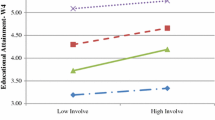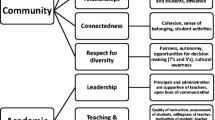Abstract
Behavior problems among preschool children are common. They are important targets for intervention because early externalizing problems and self-regulation issues tend to persist without appropriate attention, and can affect later mental health and school achievement outcomes. However, few preschool curricula addressing social and emotional development exist, and evidence for effects are mixed. In this study, the Second Step Pre/Kindergarten Social and Emotional Learning curriculum was adapted and tested in a small cluster randomized pilot study of community preschool classrooms to determine if it could improve outcomes in: (1) individual children’s teacher-rated behavior problems and prosocial skills; (2) classroom climate (classroom interactions and two measures of disruptive behavior); and (3) teacher interaction skills. Year 1 outcomes were modest and were accounted for by baseline differences. In Year 2, classroom climate, measured by independent observers, differed significantly in intervention classrooms, largely because of declines in control classrooms, and there was some evidence for better teacher interaction skills in intervention classrooms. The pattern of effects suggests important impacts on classroom quality worth investigating in a larger study. Both fidelity and implementation rates, as well as positive teacher responses to the curriculum, indicate potential for widespread adoption.

Similar content being viewed by others
References
Alkon, A., Ramler, M., & MacLennan, K. (2003). Evaluation of mental health consultation in child care centers. Early Childhood Education Journal, 31, 91–99.
Arnett, J. (1989). Caregiving in day-care centers. Does training matter? Journal of Applied Developmental Psychology, 10, 541–552.
Baker, J. A., Kamphaus, R. W., Horne, A. M., & Winsor, A. P. (2006). Evidence for population-based perspectives on children’s behavioral adjustment and needs for service delivery in schools. School Psychology Review, 35, 31–46.
Bayat, M., Mindes, G., & Covitt, S. (2010). What does RTI (response to intervention) look like in preschool? Early Childhood Education Journal, 37, 493–500.
Committee for Children. (2002). Second step: Preschool kindergarten social/emotional learning kit; second step PreK/teacher guide; second step parent guide. Seattle, WA: Committee for Children.
Denham, S. A., Blair, K., Schmidt, M., & DeMulder, E. (2002a). Compromised emotional competence: Seeds of violence sown early? American Journal of Orthopsychiatry, 72, 70–82.
Denham, S. A., Caverly, S., Schmidt, M., Blair, K., DeMulder, E., Caal, S., et al. (2002b). Preschool understanding of emotions: Contributions to classroom anger and aggression. Journal of Child Psychology and Psychiatry, 43, 901–916.
Dodge, D. T., Colker, L. J., & Heroman, C. (2002). The creative curriculum for preschool. Washington, DC: Teaching Strategies.
Domitrovich, C. E., Cortes, R. C., & Greenberg, M. T. (2007). Improving young children’s social and emotional competence: A randomized trial of the preschool “PATHS” curriculum. The Journal of Primary Prevention, 28, 67–91.
Eyberg, S., & Pincus, D. (1999). Eyberg Child Behavior Inventory and Sutter-Eyberg Student Behavior Inventory-Revised: Professional manual. Lutz, FL: Psychological Assessments Resources, Inc.
Fox, L., Dunlap, G., Hemmeter, J. L., Joseph, G. E., & Strain, P. S. (2003). The teaching pyramid: A model for supporting social competence and preventing challenging behavior in young children. Young Children, 58, 48–52.
Gilliam, W. S. (2005). Prekindergartners left behind: Expulsion rates in state preK systems. New Haven, CT: Child Study Center, Yale University School of Medicine.
Gilliam, W. S. (2007). Early childhood consultation partnership: Results of a random-controlled evaluation. Final Report and Executive Summary. New Haven, CT: Child Study Center, Yale University School of Medicine.
Grimm, K. J., Steele, J. S., Mashburn, A. J., Burchinal, M., & Pianta, R. C. (2010). Early behavioral associations of achievement trajectories. Developmental Psychology, 46, 976–983.
Harms, T., Clifford, R. M., & Cryer, D. (1998). Early Childhood Environment Rating Scale-Revised. New York: Teachers College Press.
Hogan, A. E., Scott, K. G., & Bauer, C. R. (1992). The adaptive social behavior inventory (ASBI): A new assessment of social competence in high-risk three-year-olds. Journal of Psychoeducational Assessment, 10, 230–239.
Howes, C., Phillips, D. A., & Whitebrook, M. (1992). Thresholds of quality: Implications for the social development of children in center-based child care. Child Development, 63, 449–460.
Izard, C., Fine, S., Schultz, D., Mostow, A., Ackerman, B., & Youngstrom, E. (2001). Emotion knowledge as a predictor of social behavior and academic competence in children at risk. Psychological Science, 12, 18–23.
Izard, C. E., King, K. A., Trentacosta, C. J., Morgan, J. R., Laurenceau, J., Kranthamer-Ewing, E. S., et al. (2008). Accelerating the development of emotional competence in Head Start children: Effects on adaptive and maladaptive behavior. Development and Psychopathology, 20, 369–397.
Maslach, C., Jackson, S. E., & Leiter, M. P. (1996). Maslach Burnout Inventory manual (3rd ed.). Palo Alto, CA: Consulting Psychology Press.
McMahon, S. D., Washburn, J., Felix, E. D., Yakin, J., & Childrey, G. (2000). Violence prevention: Program effects on urban preschool and kindergarten children. Applied and Preventive Psychology, 9, 271–281.
Perry, D. F., Dunne, M. C., McFadden, L., & Campbell, D. (2008). Reducing the risk for preschool expulsion: Mental health consultation for young children with challenging behaviors. Journal of Child and Family Studies, 17, 44–54.
Pierce, E. W., Ewing, L. J., & Campbell, S. B. (1999). Diagnostic status and symptomatic behavior of hard-to-manage preschool children in middle childhood and early adolescence. Journal of Clinical Child Psychology, 28, 44–57.
Qi, C. H., & Kaiser, A. P. (2003). Behavior problems of preschool children from low income families: Review of the literature. Topics in Early Childhood Special Education, 23, 188–216.
Raver, C. C., Jones, S. M., Li-Grining, C. P., Metzger, M., Champion, K. M., & Sardin, L. (2008). Improving preschool classroom processes: Preliminary findings from a randomized trial implemented in Head Start settings. Early Childhood Research Quarterly, 23, 10–26.
Raver, C. C., Jones, S. M., Li-Grining, C., Zhai, F., Metzger, M. W., & Soloman, B. (2009). Targeting children’s behavior problems in preschool classrooms: A cluster-randomized controlled trial. Journal of Counseling and Clinical Psychology, 77, 302–316.
Romano, E., Babchishin, L., Pagani, L. S., & Kohen, D. (2010). School readiness and later achievement: Replication and extension using a nationwide Canadian survey. Developmental Psychology, 46, 995–1007.
Schultz, D., Izard, C. E., Ackerman, B. P., & Youngstrom, E. A. (2001). Emotion knowledge in economically disadvantaged children: Self-regulatory antecedents and relations to social difficulties and withdrawal. Development and Psychopathology, 13, 53–67.
Stata Corp. (2011). College Station, TX. www.stata.com.
Technical Assistance Center on Social Emotional Intervention for Young Children (TACSE). Learn about the pyramid model. http://www.challengingbehavior.org/do/pyramid_model.htm. Downloaded 2/1/10.
Trentacosta, C. J., & Fine, S. E. (2010). Emotion knowledge, social competence, and behavior problems in childhood and adolescence: A meta-analytic review. Social Development, 19, 1–29.
Upshur, C., Wenz-Gross, M., & Reed, G. (2009). A pilot study of early childhood mental health consultation for children with behavioral problems in preschool. Early Childhood Research Quarterly, 24, 29–45.
Webster-Stratton, C., Reid, M. J., & Stoolmiller, M. (2008). Preventing conduct problems and improving school readiness: Evaluation of the incredible years teacher and child training programs in high-risk schools. Child Psychology and Psychiatry, 49, 471–488.
Wenz-Gross, M., & Upshur, C. (2012). Implementing a primary prevention social skills intervention in urban preschools: Factors associated with quality and fidelity. Early Education & Development, 23, 427–450.
Williford, A. P., & Shelton, T. L. (2008). Using mental health consultation to decrease disruptive behaviors in preschool children: Adapting an empirically-supported intervention. Journal of Child Psychology and Psychiatry, 49, 191–200.
Acknowledgments
This study was funded by an Intervention Development Grant, R34 MH073830 from the National Institute of Mental Health. We would like to thank our colleague who oversaw site operations: Lynn Hennigan, LICSW, Director of Services for the Young Child, Community Healthlink, Youth and Family Services; and staff who helped with study management and implementation, classroom observations, and data entry: Gail Sawosik, Judy Davis, Katelyn Allen, Katie Bateman, Courtney Carpenter, Rachel D’Angelo, Alicia Derry, Rachel Friendly, Jenny Hazelton, Karen Nideur, and Laura Seekamp. In addition, we owe special thanks to the staff and families of Worcester Comprehensive Child Care Services, Great Brook Valley; the YWCA of Central Massachusetts, Salem Square; Rainbow Child Development Center; and the YMCA Child Care Center, Worcester Commons.
Author information
Authors and Affiliations
Corresponding author
Rights and permissions
About this article
Cite this article
Upshur, C., Wenz-Gross, M. & Reed, G. A Pilot Study of a Primary Prevention Curriculum to Address Preschool Behavior Problems. J Primary Prevent 34, 309–327 (2013). https://doi.org/10.1007/s10935-013-0316-1
Published:
Issue Date:
DOI: https://doi.org/10.1007/s10935-013-0316-1




